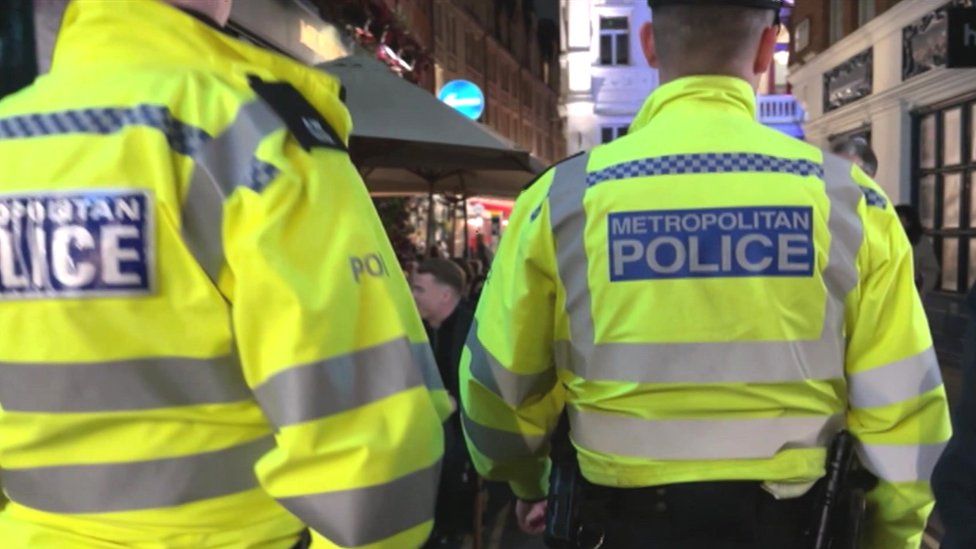
BBC London went on a Friday night ride-along with police in the West End
By Jessica Ure & Liz Jackson
BBC London
People are being warned about the dangers of spiking, amid a 13% increase in the crime in London in a year.
The Met Police is also highlighting the issue of spiking offences not involving drinks, with drugs like MDMA and Spice being used to contaminate vapes.
The force said it received 1,383 allegations of spiking in 2023 – an average of more than 26 a week.
BBC London went on patrol with officers in Soho in central London to find out more about the problem.
During the Friday night ride-along, Acting Sgt Karl Gore said: “Spiking offences are quite underreported, but nationwide and across London they are going up. It is predominantly female victims.
“Unfortunately, there are individuals out there that wish to take advantage of females.”
Statistics released by the Met suggest 60% of reported cases were from women and 40% from men, with about 60% of cases taking place place in licensed venues.
West End nightclub Tiger Tiger offers paper drink covers to help prevent spiking
Although reports of spiking are increasing, the crime is believed to be underreported and is difficult to prove, with Met Police statistics suggesting only 6% of spiking reports resulted in an arrest in 2023.
Charity Stamp Out Spiking estimates 97% of people do not report spiking incidents to the police.
The Met says spiking can lead to secondary offences being committed – most commonly sexual offences when the victim is female, and theft when the victim is male.
PC Connor Parnell says he has dealt with a large number of sexual assaults in the West End
PC Connor Parnell, who patrols the West End, said the situation “is not looking particularly good, as crimes are particularly on the rise around sexual offences”.
“We’ve had a large number of sexual assaults, primarily by touching, that I’ve had first-hand experience in dealing with in the West End,” he said.
In its efforts to crack down on spiking, the Met has partnered with 850 venues in the capital, helping to train staff to spot predatory behaviour and signs of spiking.
Welfare rooms
West End nightclub Tiger Tiger has introduced a surveillance room with dozens of CCTV screens, allowing staff to monitor suspicious activity.
A floor-plan on the wall marks hotspots where people have previously been sexually harassed or targeted.
After a spiking is reported, Tiger Tiger staff make a copy of any CCTV footage to give to police
“If something happens, a female welfare officer will go to that location straight off,” said Mark McEvoy of Novus Leisure, which owns Tiger Tiger.
“They’ll then take the victim away to the welfare room. The suspect, if we’ve identified them immediately, will be taken to another room. Police will be called.
“We’ll start then burning [copying] the CCTV so by the time the officer turns up, we have everything ready to give them.”
‘I couldn’t talk at all’
The Met says 65% of reported offences happened between 6pm and 6am, according to its data, so spiking is not limited to late-night trips out.
Love Island star Sharon Gaffka had her drink spiked while having lunch with friends in 2020, and ended up unable to talk before she passed out.
Image source, PA Media
Love Island star Sharon Gaffka says she doesn’t want to think about what could have happened
Since talking about her experience, she has received messages from people as young as 14 sharing their accounts of being spiked.
“You don’t want to think about what could have been if my friends weren’t so vigilant,” she said.
“How I was spiked is the only way I thought you could get spiked: date rape drug in a drink, that’s it.”
The fact that drinks are not the only way someone can be spiked is something the Met is highlighting with its message about the risks of sharing vapes.
In January, students at a school in Eltham, south-east London, were taken to hospital after using a vape spiked with Spice.
Det Ch Supt Angela Cragg of the Met Police said: “Spiking is a premediated and invasive crime and we are doing more to target predatory and dangerous offenders.
“Our message to victims is clear – please come forward and get the support you rightly deserve from our specially trained officers.”
Listen to the best of BBC Radio London on Sounds and follow BBC London on Facebook, external, X, external and Instagram, external. Send your story ideas to hello.bbclondon@bbc.co.uk
Related Topics
Related Internet Links
The BBC is not responsible for the content of external sites.








